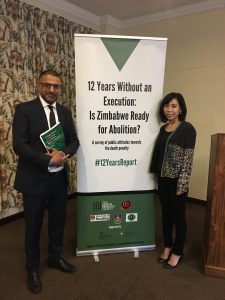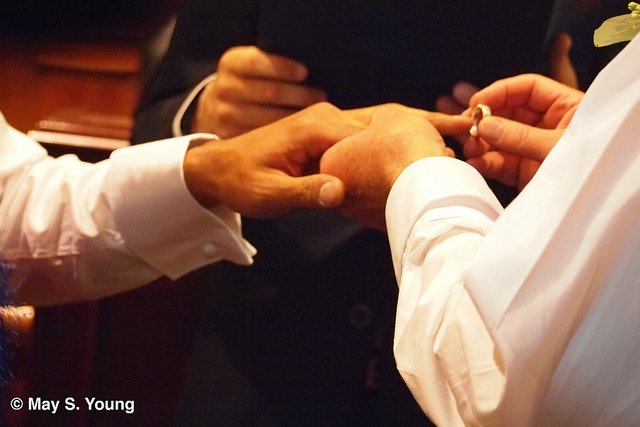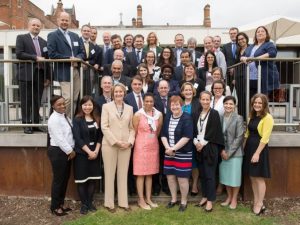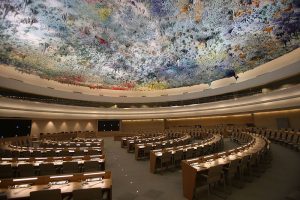Evidence against a death row inmate in Japan is shaky, but retrial is unlikely because it would damage the Japanese criminal justice system’s image of infallibility and provide an opportunity for abolitionists, says Dr Mai Sato in a new piece for The Conversation.
law
Rights for same-sex married couples to move around the EU confirmed in landmark ruling
Dr Alina Tryfonidou explores a landmark EU Court of Justice ruling which provides greater clarity and legal certainty for same-sex couples who get married in an EU member state, in a new post for The Conversation.
Image credit: May S Young (Flickr), CC-BY-2.0
In an historic ruling for the rights of same-sex couples, the EU Court of Justice (ECJ) has held that for the purposes of EU free movement law, the notion of a “spouse” includes the same-sex spouse of an EU citizen.
The case was referred to the ECJ from the Romanian Constitutional Court which was confronted with a dispute between a couple, Adrian Coman, a Romanian national, and Claibourn Hamilton, a US national, and the Romanian authorities. After living for a number of years in Belgium, where the couple married, Coman wished to return to Romania with his spouse. But Hamilton was refused the right to reside in Romania as Coman’s husband, on the grounds that Romania does not recognise same-sex marriage.
12 years without an execution: Is Zimbabwe ready to abolish the death penalty?
Dr Mai Sato has just published a report examining Zimbabwean citizens’ attitudes towards the death penalty in their country which concludes that public opinion needn’t pose a barrier to its abolition. She explains more in this new post for The Conversation.
At the end of 2017, the world watched with keen interest as President Robert Mugabe was deposed after 37 years of ruinous rule, and replaced by Emmerson Mnangagwa, who promised “a new democracy”.
The change of power is also significant for those interested in Zimbabwe’s death penalty policy. Mugabe, around the time of his departure from office, had plans to resume executions. Advertisements were placed to recruit a hangman – a position that had been vacant since 2005. Mnangagwa, on the other hand, has been vocal in his opposition to the death penalty. Significantly, he himself had faced the prospect of being hanged under the government of Ian Smith, against which he fought during the liberation war.
News from Prosperity and Resilience: Walker Institute and Marie Aronsson-Storier
The School of Law and the Walker Institute, together with the American Society of International Law, held the Disaster Risk Reduction and International Law Symposium at UoR between 29 June and 1 July 2017. The highly engaging Symposium brought together academic, government, industry, IGO, and NGO participants from all over the world to explore this rapidly growing area of law, policy and practice.
Top UN expert’s resignation spells trouble for defenders of LGBT rights
by Rosa Freedman, School of Law, University of Reading
Vitit Muntarbhorn, the UN’s first Independent Expert on protection against violence and discrimination based on sexual orientation and gender identity, has resigned after a just year in his post, citing ill health and caring responsibilities. Before stepping down, he will deliver his second and final report. This is just the latest development in a long-running UN battle over LGBT rights – and it could herald a new attempt to undermine international efforts to protect and promote the fundamental human rights of LGBT individuals.
Armed drones in the ‘right hands’
By Dr Lawrence Hill-Cawthorne,
Associate Professor in Public International Law, University of Reading
A recent BBC news article reported on the development of a new, smaller type of armed drone that is able to aim and fire at targets in mid-flight, close to the ground. The drone is available for private sale, and the article notes the concern that such weapons technology could fall into the ‘wrong hands’ and be employed by terrorist organisations to target civilians. Indeed, it has been reported that Islamic State now uses low-cost drones in lethal ways by attaching explosives to them.
It is right to ask what happens if these weapons fall into the ‘wrong hands’. But whose, then, are the ‘right hands’? The assumption here, of course, is that States will use drones in a more reasonable, limited and law-abiding way. But we must not lose sight of the dangers potentially posed by drones in the hands of States.
Supreme Court Brexit ruling: What will the judges’ decision mean?
By Dr Ruvi Ziegler – lecturer in law and researcher of citizenship and electoral rights at the School of Law, University of Reading
The Supreme Court will determine on Tuesday whether the Government have power to give notice pursuant to Article 50 of the Treaty on EU of the UK’s intention to withdraw from the EU without an Act of Parliament providing prior authorisation to do so. The PM has announced that she intended to ‘trigger’ Article 50 before the end of March 2017.
Many may ask: what difference will the ruling actually make?
Empowering judges to speak outside the courts
Lawrence McNamara is an ESRC Global Uncertainties research fellow at the University of Reading where he runs the Law, Terrorism and the Right to Know project which includes interviews with several judges.
This piece first appeared in The Guardian.
What should judges be able say outside the courts? One of the most senior judges, Lord Neuberger, has proposed some principles for “extra-judicial” statements. The speech, published this month, is an important one as these principles are likely to shape judicial contributions to public debate for some time to come, but do they go far enough?
The starting point is familiar: it is “quite inappropriate” for politicians to criticise judges or their decisions. There must be “mutual respect” between ministers and the judiciary. If they “slang each other off in public” it undermines the constitution, democracy and the rule of law. While the frankness is welcome, the content is not overly surprising.
But then Neuberger turns to what that means for the judiciary – and here it gets interesting.
Mutual respect means ministers and judges “must respect the other’s turf and not tread on it”. It means judges should not “answer back”. It is “unseemly and more undermining” to do so. However, it does not mean that judges should not speak at all. On the contrary, Neuberger says extra-judicial comments have “more benefits than drawbacks”. While he dictates caution and warns judges not to “seek publicity for its own sake” or to seek it for causes, his seven principles empower judges to speak.
Neuberger is fundamentally right. The individual and collective experience of the judiciary, and their established constitutional role, means they should contribute to public debate about substance and processes of justice. The challenge is how they should do so without compromising the constitutional roles of any branch of the state.
One path is obviously through judgments. This does not mean judicial activism but – this is different – judicial engagement. Judges have made pointed observations about any number of matters such as laws about police interviews, procedures in terrorism trials, or dealing with children who have committed serious crimes. For the public, the problem is many judgments are accessible. There are some excellent open databases of appeal judgments but the vast majority of trial judgments and sentencing remarks are unreported and unavailable to the public. It is time this was changed, especially if one takes the view that extra-judicial statements should be minimal.
An alternative path is through speeches or written pieces. In the week the international criminal court delivered its first verdict, ‘Reflections of a Trial Judge’ by Sir Adrian Fulford, leading judge in the Lubanga case and a high court judge, is an important contribution. Judges can articulate and explain from the horse’s mouth how the judicial role works and what they see as key contemporary issues. The lord chief justice and Neuberger himself are exemplary speakers in this regard. The supreme court’s mission includes promoting “knowledge of the ways in which justice should be rightly administered.” It is right that judges engage outside their judgments.
Of course, judges across the land will not be reading Neuberger’s principles and thinking, “Excellent! At last I have some clear guidance about when I should speak and what I can say.” In spite of a judicial appearance on Masterchef, judges will inevitably be cautious of any public engagement with audiences outside the legal profession. Most judges will remain cautious and silent, and probably rightly so. At the senior end of the spectrum, though, while they will choose their battles carefully, Neuberger may have laid the ground for some interesting and well-chosen comments in the next couple of years.
Is there a point where judges would go too far? Or what might we be missing if they stop short? The justice and security green paper is a crucial contemporary case in point.
The conventional position is that judges “cannot comment on public policy” but can comment on “the practical consequences of certain policy choices”. We recently heard justice secretary Ken Clarke tell this to the joint committee on human rights in evidence to its inquiry into the green paper proposals for closed proceedings in civil cases.
For Neuberger, however, judges do not seem quite so restricted. Where policy “goes to the heart of the functioning of the judicial branch” then comment is not merely permissible, but there is arguably a judicial duty to comment. It might well be thought that closed proceedings, access to evidence and evaluation of evidence fall into that category. A judicial contribution to the justice and security debate would inform and enhance the process and policy choices that are made.
In England and Wales there could be more use of representative bodies to convey judicial views, especially on contentious issues. This would avoid it falling to individual judges to give evidence to committees, which rightly concerns Neuberger. By contrast, this week the Judicial Conference of Australia has made a submission on mandatory sentencing that was requested by a parliamentary inquiry into proposed legislative amendments. It may be an approach worth considering more widely that would enhance the judicial contributions and avoid damage to the constitutional framework.






